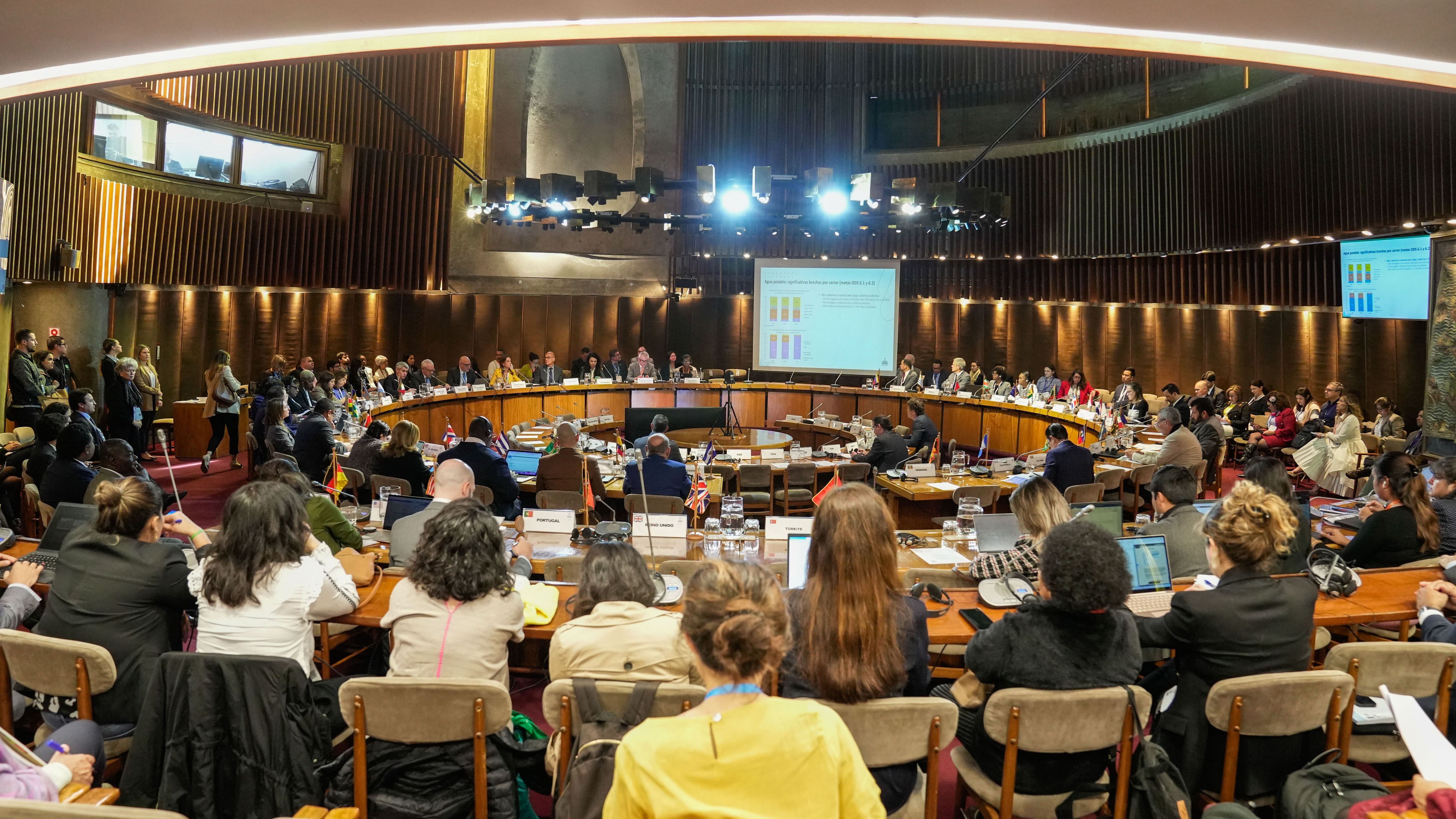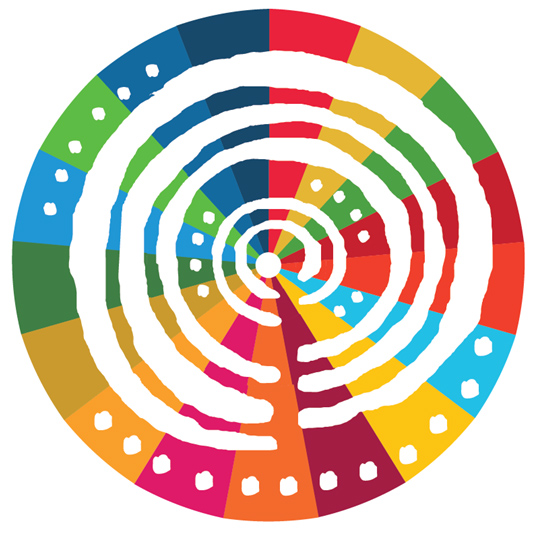Latin America and the Caribbean Must Pick Up the Pace to Achieve Fulfillment of the Sustainable Development Goals by 2030
Work area(s)
Halfway through the period agreed upon by United Nations Member States in 2015, greater progress on the targets will require the participation of all stakeholders as well as structural transformations in the region, delegates warned at the conclusion of the Sixth Meeting of the Forum of the Countries of Latin America and the Caribbean on Sustainable Development.

Latin America and the Caribbean must pick up the pace to achieve fulfillment of the 2030 Agenda’s Sustainable Development Goals (SDGs), representatives of the region’s 33 countries, of United Nations agencies and of regional, multilateral and civil society organizations warned today at the Sixth Meeting of the Forum of the Countries of Latin America and the Caribbean on Sustainable Development, which concluded this Friday, April 28, at ECLAC’s central headquarters in Santiago, Chile.
As the meeting came to a close, the delegates insisted that while we are halfway through the period agreed upon by the United Nations’ Member States in 2015 (to reach 2030), we have not gotten halfway along the path to fulfill the targets. For that reason, initiatives are needed in which all relevant actors participate, with a forward-looking vision and sense and with high impact, which would work on the structural transformations the region needs in order to resume and sustain the path to 2030, they emphasized.
According to the analysis done by the Economic Commission for Latin America and the Caribbean (ECLAC) that was released at this Forum, only 24.6% of the targets have been achieved or are expected to be achieved with current trends; for nearly half the targets (48.4%), the trend is correct but is insufficient for achieving them; and for 27.0% of the targets, there is a backsliding trend.
Over the three days of the Sixth Meeting of the Forum of the Countries of Latin America and the Caribbean on Sustainable Development – which brought together more than 650 people, including nearly 170 representatives of government, more than 300 from civil society, including academia and the private sector, around 150 representatives of the United Nations system, and resident coordinators – participants evaluated the implementation and fulfillment of five SDGs in the region: SDG 6 (Clean water and sanitation), SDG 7 (Affordable and clean energy), SDG 9 (Industry, innovation and infrastructure), SDG 11 (Sustainable cities and communities) and SDG 17 (Partnerships for the Goals). They also shared experiences, good practices and challenges that countries have had to address in relation to this task.
On the third and final day of the Forum, a high-level panel discussion was held under the theme of “Path to the SDG Summit. Transformative initiatives: creating opportunities to strengthen commitment to the 2030 Agenda for Sustainable Development and its full implementation at all levels.” The participants were María del Carmen Squeff, Permanent Representative of Argentina to the United Nations, the country serving as Chair of the Forum of the Countries of Latin America and the Caribbean on Sustainable Development; José Manuel Salazar-Xirinachs, Executive Secretary of ECLAC; Pedro Luis Pedroso, Ambassador and Special Representative of Cuba to the United Nations and Coordinator for Cuba’s Presidency of the Group of 77 and China (G-77 and China); Paula Narváez, Permanent Representative of Chile to the United Nations, which is the country holding the Vice Presidency of the Economic and Social Council (ECOSOC); and Luis Felipe López-Calva, Global Director of the Poverty and Equity Global Practice at the World Bank.
The panelists stressed the importance of reinforcing countries’ commitment to the 2030 Agenda and thinking about those transformative initiatives that would allow for addressing the enormous challenges they face, as well as expanding development cooperation, especially South-South cooperation, and access to long-term financing for middle-income countries, which includes the majority of Latin American and Caribbean nations.
In regard to this, ECLAC’s Executive Secretary, José Manuel Salazar-Xirinachs, recalled the seven transformative initiatives with the capacity to produce synergistic and multiplier effects to drive the achievement of several SDGs at once, which were presented by the UN regional organization in the Forum’s main document, Halfway to 2030 in Latin America and the Caribbean: progress and recommendations for acceleration, which constitutes the sixth report on regional progress and challenges in relation to the 2030 Agenda for Sustainable Development.
“Giving impetus to these transformative initiatives – the energy transition, the bioeconomy, the digital transformation, promoting exports of modern services, the care society, sustainable tourism and regional integration – will require new instruments of public policy design and implementation based on a strategic, long-term vision. The exploration of possible futures and the foresight capacity of the distinct actors who define public policy is critical for taking advantage of the best scenarios for opportunities,” Salazar-Xirinachs indicated.
At the same time, ECLAC’s Executive Secretary praised the knowledge and contributions with which the entire United Nations System is supporting the region’s countries on attainment of the SDGs.
At the Forum’s closing session, representatives of the youth and of the Mechanism for Civil Society Participation in the Sustainable Development Agenda and in the Forum of the Countries of Latin America and the Caribbean on Sustainable Development read a declaration in which they reaffirmed the commitment to the 2030 Agenda and also warned that if we stay on the current path, the SDGs will not be achieved, especially in substantive areas for life such as health, education, gender equality, participation and justice.
At the closing ceremony, ECLAC’s Executive Secretary was accompanied by the President of the National Council for the Coordination of Social Policies of Argentina, Marisol Merquel, who served as Chair of the Forum of the Countries of Latin America and the Caribbean on Sustainable Development 2023.
Merquel indicated that after three intense days of dialogue on the issues that concern our region, “I am convinced that we have an enormous challenge ahead.”
“Without a doubt, building partnerships is the essential tool that will allow us to move forward and accelerate progress and achieve the big aspirations posed by the 2030 Agenda, putting the dignity of all the people who inhabit this world at the center of action,” Merquel added.
Meanwhile, ECLAC’s Executive Secretary stressed that on the various panels for analysis and dialogue held over the last three days, the need to pick up the pace has been a common theme. “We are concerned that halfway through the period to 2030, only one-fourth of the targets have been fulfilled or are forecast to be fulfilled. There is much work to be done,” he declared.
“One of the lessons learned over recent years has been what we have called the positive ‘institutional footprint’ that implementation of the 2030 Agenda has left in our countries, with public, private and civil society institutions that are working hard to achieve the SDGs. The institutional capacities forged over these last eight years have strengthened the set of instruments for measurement and public policy design for fulfilling the 2030 Agenda. This Forum is an essential part of that institutional footprint, which year after year has been growing and getting stronger, innovating and bringing new perspectives,” José Manuel Salazar-Xirinachs indicated. “ECLAC on its seventy-fifth anniversary is redoubling its commitment to continue working for a more productive, inclusive and sustainable future.”
At the end of the meeting, the country representatives approved a final document with the Intergovernmentally agreed conclusions and recommendations of the Sixth Meeting of the Forum of the Countries of Latin America and the Caribbean on Sustainable Development, in which they reaffirm their commitment to effectively implement the 2030 Agenda for Sustainable Development, ensuring that no one is left behind, including its Goals and targets, which are integrated and indivisible and balance the three dimensions of sustainable development – economic, social and environmental. They also stress that the Agenda is people-centered, universal and transformative and that eradicating poverty in all its forms and dimensions, including extreme poverty, is the greatest challenge facing the world and is an indispensable requirement for sustainable development, which is why it is crucial to reach the furthest behind first and empower those in vulnerable situations.
In the document consisting of 110 paragraphs, the countries also state that they note with concern that the SDG targets with a 2020 deadline have not been fully achieved, and in this regard they call upon the international community to reinforce actions to address those specific challenges, including to protect biodiversity, develop disaster risk reduction strategies, increase the availability of timely, quality and disaggregated data, engage youth, and enhance financial resources, capacity-building and technology transfer to developing countries.
In addition, they recognize that inequalities remain pervasive in countries of Latin America and the Caribbean and that tackling inequality requires, among other things, further investment in social services, including social protection services, and economic opportunities in a partnership between governments, national and local authorities, the private sector, the international financial system, civil society, academia and other relevant stakeholders working together, in accordance with national plans and policies, in order to achieve the 2030 Agenda for Sustainable Development.
Furthermore, they recognize the role of ECLAC as an essential component of the United Nations development system, given its convening function as an intergovernmental platform for policy advice and dialogue. They also enjoin the countries of the region that have already presented voluntary national reviews and those that are preparing to do so, to persevere on their efforts to implement the 2030 Agenda for Sustainable Development, particularly by integrating it into their national strategies and adjusting their institutional arrangements.
The Forum’s conclusions and recommendations will be presented by the Chair of the 39th session of ECLAC – held by Argentina – to the United Nations High-level Political Forum on Sustainable Development (HLPF) 2023, due to take place in July in New York under the auspices of the Economic and Social Council, along with the 2022 System-Wide Results Report of the Regional Collaborative Platform for Latin America and the Caribbean.
Related event
Related content

Countries Agree on the Urgency of Promoting Bold, Transformative Actions to Speed and Correct the Course Towards Achieving the SDGs
The Sixth Meeting of the Forum of the Countries of Latin America and the Caribbean on Sustainable Development was inaugurated today at ECLAC’s central headquarters in Santiago, Chile.

ECLAC Urges Countries to Revitalize Commitments and Accelerate the Pace Towards Fulfilling the Sustainable Development Goals
José Manuel Salazar-Xirinachs, the organization’s Executive Secretary, presented a document that proposes seven transformative initiatives that have the synergistic capacity to simultaneously drive…

The Region’s Countries Evaluated the Implementation of Four SDGs on the Second Day of the Forum on Sustainable Development
It is necessary to redouble efforts to achieve Sustainable Development Goals (SDGs) 6, 7, 9 and 11, representatives asserted at the meeting being held at ECLAC’s headquarters in Santiago, Chile.
Halfway to 2030 in Latin America and the Caribbean: Progress and recommendations for acceleration
Sixth report on regional progress and challenges in relation to the 2030 Agenda for Sustainable Development in Latin America and the Caribbean. Presentation by José Manuel Salazar-Xirinachs,…
Country(ies)
- Latin America and the Caribbean
